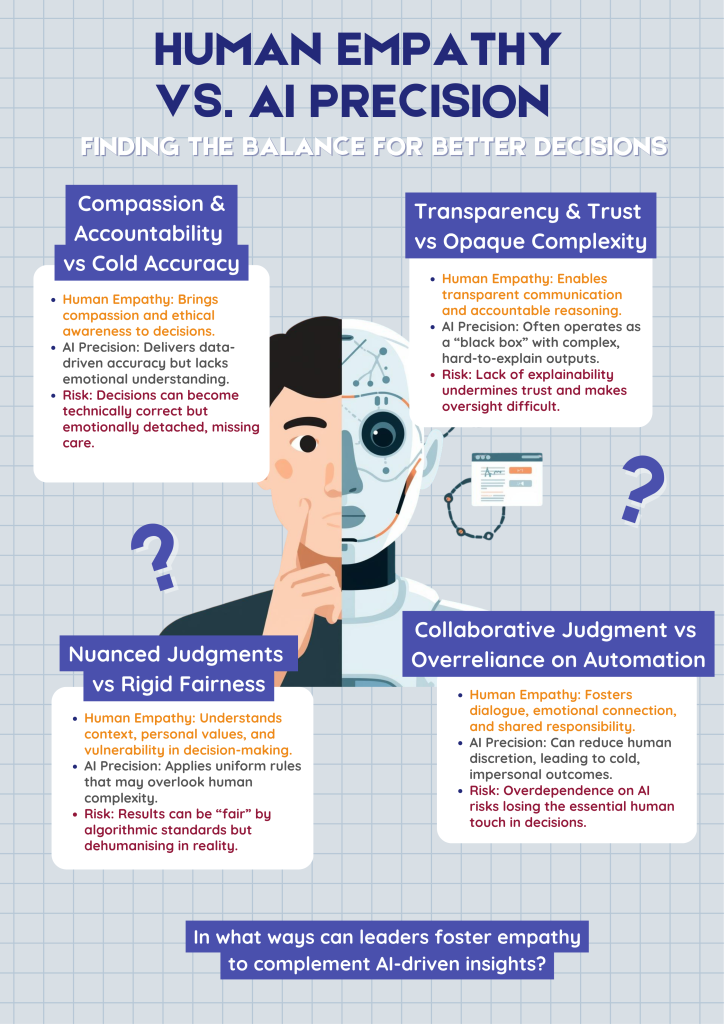The Crucial Role of Empathy
In our ongoing exploration of Emotional Intelligence in the Workplace, where we covered self-awareness and mastering feedback. Now, it’s time to examine the skill that transforms insight into strategy: empathy in decision-making. Empathy is a skill that combines perspective-taking with emotional attunement, which enables compassion and cooperation.
Empathy plays a dual role in effective leadership. It forms the foundation of trust-based relationships that sustain healthy, high-performing teams, strengthening both well-being and productivity. At the same time, empathy enhances the quality and integrity of decision-making. When leaders take the time to understand others’ emotions and viewpoints, they reduce the risk of narrow or self-serving choices. This broader, human-centered perspective allows decision-makers to anticipate needs, balance diverse interests, and craft solutions that are ethical, inclusive, and impactful.
When Competence Alone Isn’t Enough
In our results-driven world, it’s easy to celebrate leaders who get the job done. We often praise those with sharp technical skills and relentless focus on targets. But what if this very strength creates an invisible barrier to lasting success? This is what is known as The Competence Ceiling. It describes a common phenomenon: a highly capable, low-EQ leader can deliver impressive short-term results but hits an invisible limit that blocks sustainable growth.

Competence and technical expertise alone is not enough because leading is fundamentally about influencing and connecting with people, not merely completing tasks. The numbers may look good, but they often mask a deeper crisis: silent disengagement, fuelled by employees feeling unheard and fundamentally undervalued. By prioritising competence over emotional intelligence, leaders risk building a fundamentally fragile organisational structure. They may unknowingly leave the business vulnerable to rapid talent drain, innovation failure, and reputational damage.
Where earlier models of leadership emphasised measurable expertise and intelligence, today, effective leadership increasingly relies on emotional and relational skills, including empathy and self-awareness. While competence allows leaders to execute tasks and achieve objectives, empathy drives people-centered leadership and transforms a manager into a leader who can connect, motivate, and nurture their team while upholding ethical standards.
Leading with Both Head and Heart
Empathy is often viewed as a universally positive trait but oversimplifying it can hinder effective decision-making. Empathy isn’t a single, uniform concept. It comprises two distinct forms—cognitive empathy and emotional empathy—each influencing outcomes in very different ways.
Emotional empathy is the ability to feel and resonate with others’ emotions, such as feeling distress when someone else is distressed. In organisational contexts, emotional empathy enables leaders and innovators to design and create products, services and experiences that resonate with people’s needs. It fosters prosocial behaviour and ethical awareness, helping leaders make fair, socially responsible choices while maintaining trust, cohesion and effective stakeholder relationships.
However, leaders who over-identify with others’ emotions risk clouded judgment, emotional exhaustion, or reluctance to make difficult but necessary decisions. Excessive emotional involvement can lead to risk aversion, particularly when implementing disruptive ideas. Effective leaders must tune in to others’ emotions without taking them on as their own. Understanding the feelings of others without being consumed by them is what sustains both compassion and sound judgment.
In contrast, cognitive empathy is the ability to understand others’ perspectives and mental states without becoming emotionally entangled. It supports rational judgment and strategic insight, enabling leaders to navigate social complexities, frame problems and implement solutions effectively. By focusing on perspective-taking rather than emotional resonance, cognitive empathy helps overcome barriers and drive innovation.
Yet, relying solely on cognitive empathy has its own limitations. Leaders may understand others’ viewpoints intellectually yet fail to connect with their feelings, resulting in decisions that seem logical but lack compassion or social sensitivity. Excessive cognitive empathy can also lead to emotional detachment, making interactions feel impersonal, weakening trust, collaboration, and stakeholder engagement.
Ultimately, the impact of empathy on decision-making depends on how leaders apply it. Cognitive empathy brings strategic insight and perspective, while emotional empathy builds ethical awareness and social connection. Too much of either, without balance, can create challenges. The most effective leadership arises when cognitive and emotional empathy work in concert, providing a foundation for decisions that are both thoughtful and trustworthy, benefitting both people and the organisation.
AI, Algorithms, and the Risk of Empathy-Free Decisions
AI and algorithms have made decision-making faster and more accurate, increasingly shaping critical areas like finance and healthcare. They offer clear benefits, including reducing human bias. However, without human empathy, decisions risk being accurate yet ethically hollow. Striking the right balance is key to achieving fair, trustworthy, and humane outcomes.
However, relying solely on AI carries significant risks. These systems lack essential human qualities such as empathy and compassion, which are traits vital for making ethical and humane decisions. It cannot weigh complex moral trade-offs, consider the nuanced needs of diverse stakeholders, or adapt recommendations to specific social and emotional contexts. While algorithmic choices may appear fair on paper, they often miss the nuanced understanding that only humans can provide. Additionally, many complex AI models are opaque, making it difficult to assign accountability and eroding trust.

For leaders, the challenge is clear: how should we balance the efficiency of AI with the emotional intelligence of humans? AI can manage data and facts, but humans must bring empathy and judgment to the table. Designing systems that keep human communication at the core is essential to avoid sterile, dehumanised outcomes. At the end of the day, technology should support the human heart in decision-making.
Why We Need Human EQ Now More Than Ever
Emotional intelligence enables humans to understand and resonate with others’ feelings, anticipate emotional reactions, and respond in ways that maintain trust, collaboration, and social cohesion. These are qualities that cannot be replicated by even the most advanced algorithms. Across diverse fields such as healthcare, education, or business, this human touch is indispensable. For example, a doctor or nurse may rely on AI to identify treatment options, but humans provide empathic support by listening attentively to patients’ fears and concerns, and this preserves the human connection essential for trust and adherence to care.
Furthermore, empathy and emotional intelligence acts as a counterbalance to the risks of dehumanisation in highly automated environments. Decisions made solely through algorithms may prioritise efficiency, accuracy, or cost-effectiveness, but they cannot account for the psychological, emotional, and ethical dimensions of human life. For example, an AI system may recommend layoffs based on performance metrics, but leaders with high EQ can navigate the process in a way that communicates respect, provides support, and mitigates the psychological toll on employees. It encourages leaders to ask questions that data alone cannot answer: How will this decision affect trust, morale, and social cohesion? Could the choice unintentionally reinforce biases or inequalities?
Far from being a soft skill, empathy is becoming a vital tool to protect humanity from being sidelined in decision-making processes that are otherwise dominated by impersonal technological logic.
How Leaders Can Rebuild Empathy into Their Decision-Making

Rebuilding empathy requires deliberate, ongoing effort because empathy is not just an innate trait, it is a skill that can be developed and strengthened over time. Leaders can enhance their decision-making by deliberately cultivating both cognitive and emotional empathy. When applied together, these forms of empathy enable leaders to navigate complexity, foster trust and collaboration, and make decisions that are both strategically effective and ethically grounded. Cognitive empathy alone can feel detached, while emotional empathy alone can overwhelm or hinder, the combination of both ensures balance and impact.
Cognitive empathy can be strengthened by actively seeking diverse perspectives, asking open-ended questions, engaging in perspective-taking exercises, and using structured approaches like design thinking to frame problems from others’ viewpoints. Emotional empathy can be nurtured through mindfulness, active listening, and intentionally tuning into the feelings of others while managing one’s own emotional responses.
Importantly, empathy is not a one-time effort. Building it requires continuous practice, reflection, feedback, and adjustment as situations and stakeholders change. By embedding empathy into organisational culture through experiential learning, coaching, and mentoring, leaders can ensure it consistently guides decision-making. In this way, empathy becomes a cultivated skill that allows leaders to make decisions that are both effective and humane, balancing strategy with human connection.
Stay ahead with exclusive insights! Sign up for our mailing list and never miss an article. Be the first to discover inspiring stories, valuable insights and expert tips – straight to your inbox!




